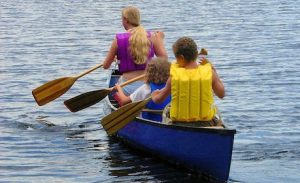One of the many joys of parenthood is helping children navigate new waters. And, while often these situations are met with hesitation, slight anxiety — or in the case of some first-time campers, homesickness — it is these moments that develop the twenty-first century skills needed in adulthood. New situations, such as going away to camp, serve as teachers in life’s classroom — developing leadership, self-esteem, teamwork, independence, and problem-solving.
It’s important, even critical, for parents to help children overcome any feelings of hesitation in order to help them grow. Take camp, for example. From a child’s perspective, camp is fun, fun, fun! Parents know that camp provides immeasurable growth opportunities, and is a vital part of childhood. As the day approaches, even the most excited campers sometimes get nervous about being away from home. “Homesickness is completely normal,” said Michael Thompson, consultant, author, and psychologist in a recent PBS Parents article*. “If a child loves his or her parents and has a good home, why wouldn’t he or she feel some longing for mom, for dad, for the dog, or for home cooking?”
It is up to parents, then, to help ease the transition to camp, and help their children grow from the experience. The American Camp Association® (ACA) suggests the following advice to help alleviate anxiety and get a jump start on life’s lessons.
- Encourage independence throughout the year. Practice separations, such as sleepovers at a friend’s house, can simulate the camp environment.
- Involve children in the process of preparing for camp. The more they own the decision, the more comfortable they will feel being at camp.
- Make sure to understand the camp’s philosophy on how issues, such as homesickness, are addressed. Talk candidly with the camp director to understand his/her perspective on the adjustment to camp life.
- Discuss what to expect at camp before leaving for camp. Consider role-playing anticipated situations, such as using a flashlight to find the bathroom.
- Reach an agreement ahead of time on calling each other, but make sure to honor the camp’s policy on phone calls.
- Send a note or care package ahead of time to arrive the first day of camp. Acknowledge missing the child, in a positive way. For example, saying “I am going to miss you, but I know that you will have a good time at camp,” lets the camper know that families are thinking about them, but confident in their ability to adapt to camp.
- Pack a personal item or two from home, such as a stuffed animal.
- Avoid bribing behaviors. Families send the wrong message when they link a successful stay at camp to a material object. Families should focus on the real rewards — like new found confidence and independence.
- Don’t plan an exit strategy. If a “rescue call” comes from the child, offer calm reassurance and put the time frame into perspective.
While most incidents of homesickness pass quickly, parents know their child best. If parents have concerns (for example, the child is not eating or sleeping, or appears overly anxious), they should immediately talk to their camp director. Camp staff are trained to identify and ease homesickness, and are a valuable resource for parents as well as campers.
*Michael Thompson, Ph.D., “Helping Kids Beat Homesickness at Sleep-Away Camp,” PBS Parents, May 2011.
About ACA
The American Camp Association® (ACA) is a national organization with more than 10,000 individual members and nearly 3,000 member camps. ACA is committed to collaborating with those who believe in quality camp and outdoor experiences for children, youth, and adults. ACA provides advocacy and evidence-based education and professional development, and is the only national accrediting body for the organized camp experience. ACA accredits approximately 2,400 diverse camps nationally. ACA-Accredited® Camps meet up to 300 health and safety standards. Accreditation provides public evidence of a camp’s commitment to the health, safety, and overall well-being of both campers and staff. For more information, visit www.ACAcamps.org.
Reprinted by permission of the American Camp Association. ©2017, American Camping Association, Inc.





